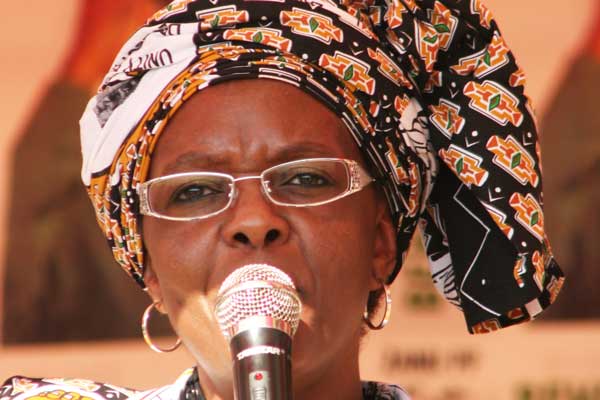
FIRST Lady Grace Mugabe yesterday stunned Zanu PF delegates gathered in Binga when she chastised men, saying they should go for sex workers as the practice has been legalised, instead of raping minors.
By Everson Mushava
Addressing a sizeable crowd of Zanu PF supporters at a rally where she commissioned a water project at Bulawayo Kraal irrigation scheme, Grace diverted from her prepared speech and tore into men who resorted to abusing young girls and turning them into concubines, instead of wooing sex workers.
Grace suggested “men with insatiable appetites must go for sex workers because they have been given a blank cheque to freely offer their services by the courts”.
“Don’t rape minors, prostitutes are there,” she thundered.
“Isn’t prostitutes have been allowed to freely do their work.”
The Constitutional Court recently ruled that women should not be arrested on allegations of loitering for purposes of prostitution, a ruling many interpreted to mean sex work had been legalised.
The First Lady said girls, like fruits, should be allowed to ripen and men should exercise discipline and avoid “salivating at young girls”, whom they should regard as their own daughters.
- Chamisa under fire over US$120K donation
- Mavhunga puts DeMbare into Chibuku quarterfinals
- Pension funds bet on Cabora Bassa oilfields
- Councils defy govt fire tender directive
Keep Reading
“When I was a young girl, I was burnt with boiling water on a sensitive part of my backside,” the unrestrained Grace revealed. “Men would come and ask to see, I would show them, but none of them ever tried to abuse me because they saw me like their own daughter.”
Grace then tore into non-governmental organisations (NGOs) providing humanitarian work in Binga, accusing them of being hypocritical, dangling piecemeal services to hungry villagers during election time and advancing a regime change agenda.
“These NGOs are taking you for granted; they are giving you food handouts, and not bringing development,” she said.
“They use food to bring the regime change agenda.”
Grace’s attack on NGOs came soon after the Zanu PF provincial chair for Matabeleland North, Richard Moyo, had said there were more than 30 NGOs in the area that disguised themselves as providers of humanitarian work yet they were perpetrating a regime change agenda.
The Zanu PF Women’s League boss also unwittingly admitted that the Zanu PF government had marginalised the drought-ravaged community, a move that had allowed the opposition MDC-T to claim a majority of parliamentary seats in the region.
She said her husband, President Robert Mugabe, cared for the people of Binga.
She added Mugabe, at 91, still had power and wisdom to run the country because he was “God-sent” to the people of Zimbabwe. Grace then took a dig at opposition leader Morgan Tsvangirai, telling the villagers that they would remain poor if they continued voting for the MDC-T.
As has become the norm, she also attacked former Vice-President Joice Mujuru for being ambitious and fanning factionalism in Zanu PF.
She said Mujuru had tasted power as Acting President when Mugabe was away and assumed that the presidency was within reach. “That is what destroyed Mujuru,” she told the seemingly indifferent villagers.
“Do not be caught offside.”
Grace said her critics always thought she was a deranged woman when she started exposing Mujuru during her “meet the people tours”, adding all she said had come to pass.
“They said Mugabe’s wife has been given a whistle, and she is now blowing it everywhere,” she said.
“Yes, I blow it, without any fear.
“Indeed, the whistle has been given to the right person, I will continue to blow it and mark my words, all I say will come to pass.
“I was very sick some time ago.
“A lot of people thought I would die, but here I am, very fit.
“It is God’s work. He knows I am a whistleblower and the job needs a lot of energy. I will not hesitate to blow the whistle on those who are caught offside like Mujuru.”
Bulawayo Kraal was initiated by Mujuru and was meant to improve food security in the remote district.










